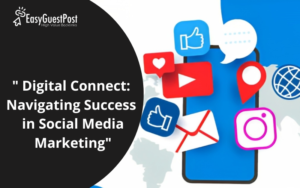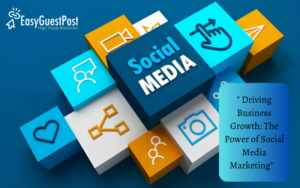“The Impact of Social Media on Political Discourse and Civic Engagement: A Comparative Analysis”
Social media has revolutionised the way that people engage in political converse. From the rise of online activism to the spread of news and information, social media has had an enormous impact on communal engagement around the world.
In this blog post, we will explore how social media has shaped political converse and communal engagement, through a relative analysis of different countries and surrounds. By looking at examples from both developed and developing nations, we can gain a better understanding of how social media transubstantiates our political geography.
1.What’s Social Media?

Social media, in its simplest form, can be defined as a collection of online platforms that enable users to produce and partake content, as well as engage in social networking. These platforms allow individualities to connect with musketeers, family, and indeed nonnatives, easing communication and the exchange of ideas on a global scale.
What sets social media piecemeal from traditional forms of media is its interactive nature. Unlike traditional media channels like journals or TV, social media allows users to laboriously share in the creation and dispersion of content. users can partake their studies, opinions, and guests through textbook, images, vids, and more, incontinently reaching a wide followership.
Social media platforms also offer features that enable users to engage in exchanges, conversations, and debates. Users can like, note, and share posts, creating a sense of community and fostering the exchange of ideas. This interactive aspect of social media has converted the way people engage in political converse. likewise, social media has broken down walls to entry, allowing anyone with internet access to share in the discussion.
This has led to a democratisation of political converse, as individualities who were preliminarily marginalised or speechless now have a platform to express their opinions and enterprises. Overall, social media has revolutionised the way people communicate and engage in political converse.
Its interactive nature and availability have normalised political exchanges and opened up new avenues for communal engagement. In the coming sections, we will explore the relationship between social media and political converse, as well as its part in communal engagement.
2.The Relationship between Social Media and Political Discourse
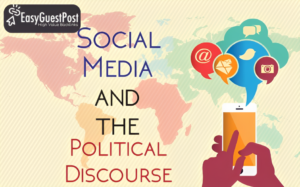 Social media has had a profound impact on political converse, unnaturally transubstantiating the way that individualities engage in exchanges about politics. With its interactive and accessible nature, social media has eased the spread of ideas and eased dialogue on a global scale.
Social media has had a profound impact on political converse, unnaturally transubstantiating the way that individualities engage in exchanges about politics. With its interactive and accessible nature, social media has eased the spread of ideas and eased dialogue on a global scale.
One key aspect of social media’s influence on political converse is its capability to connect people from different backgrounds and perspectives. In history, political conversations were frequently limited to particular networks and face- to- face relations. Still, social media has expanded the reach of these exchanges, allowing individualities with different beliefs and guests to connect and engage with one another.
Likewise, social media has empowered individualities to partake their opinions and guests , amplifying marginalised voices that may have preliminarily been unheard. It has become a platform for citizen journalism, with users suitable to partake news and information in real- time, bypassing traditional doorkeepers.
In addition, social media has given rise to new forms of political engagement, similar as online activism and digital demurrers. Hashtags and online juggernauts have played a pivotal part in marshalling communities and raising mindfulness about pressing political issues.
Still, while social media has really broadened the reach of political converse, it has also introduced challenges. The speed and volume of information on social media can lead to the spread of misinformation and the polarisation of political beliefs.
Overall, social media has had a significant impact on political converse, creating openings for engagement and giving voice to preliminarily marginalised communities. Still, it also poses challenges that need to be addressed for further productive and informed conversations.
3.The role of Social Media in Civic Engagement
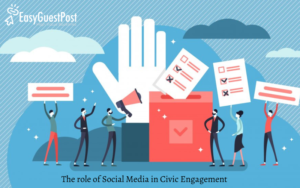
Social media has surfaced as an important tool for communal engagement, revolutionising the way individualities share in political processes. Through its interactive and accessible nature, social media platforms have given voice to marginalised communities and eased lesser participation in political exchanges.
One of the crucial places of social media in communal engagement is its capability to connect individualities with political issues and causes that they watch about. With just a few clicks, users can join online communities, subscribe to desires, and share in online activism.
Social media provides a platform for organising and marshalling people for colourful social and political movements, allowing individualities to have a real impact on policy opinions. Also, social media has enabled citizens to directly engage with their tagged representatives.
Through platforms like Twitter and Facebook, individualities can reach out to politicians, express their enterprises, and demand responsibility. This direct commerce has made politicians more accessible and responsive to the requirements of their ingredients.
Also, social media has also played a pivotal part in spreading mindfulness about important social and political issues. With the power to partake information incontinently and encyclopedically, social media has become a mecca for citizen journalism, where users can expose shafts, partake particular stories, and advocate for change.
By amplifying marginalised voices and slipping light on retired issues, social media has helped bring about social and political change. Overall, social media has significantly enhanced communal engagement by connecting individualities, amplifying their voices, and spreading mindfulness.
It has become an inestimable tool for empowering individualities to laboriously share in the political process, shaping the way society engages with political issues.
4.Case Studies examples of Social Media Impact on Political Discourse and Civic Engagement
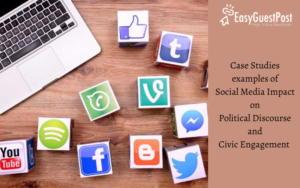
Social media has had a significant impact on political converse and communal engagement around the world. To further understand this impact, let’s explore some case studies that punctuate the transformative power of social media in different surroundings. One notable illustration is the Arab Spring, a series of revolutions in several Middle Eastern and North African countries in 2010- 2011.
Social media platforms similar as Facebook and Twitter played a pivotal part in organising and marshalling protestors, allowing them to coordinate demonstrations and share information about mortal rights abuses. The use of hashtags, similar as#Egypt and#TahrirSquare, helped amplify the voices of the protestors and draw transnational attention to their cause.
In the United States, the Black Lives Matter movement has employed social media as an important tool for raising mindfulness about police brutality and ethical injustice. The movement gained traction through viral videos and hashtags similar as#BlackLivesMatter, which enabled users to partake in their guests and advocate for systemic change.
Social media played a significant part in marshalling sympathisers, organising demurrers, and shaping public opinion. Another case study is the 2016 presidential election in the United States. Social media platforms like Facebook were used to spread misinformation and divisive content, leading to increased polarisation and the dispersion of false narratives.
This stressed the darker side of social media’s influence on political converse, showing how it can be manipulated for political gain. These case studies illustrate the different ways in which social media has shaped political converse and communal engagement.
While it has really normalised the discussion and empowered marginalised communities, it also presents challenges similar to the spread of misinformation and the polarisation of beliefs. Understanding these case studies can help us navigate the complex relationship between social media, politics, and communal engagement.
5.Criticisms of Social Media’s Influence on Political Discourse and Civic Engagement
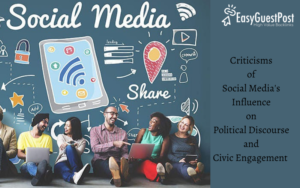 While social media has really converted political converse and communal engagement, it isn’t without its criticisms. One of the main enterprises is the spread of misinformation and the lack of fact- checking on social media platforms. With the capability for anyone to produce and partake content, false information can snappily go viral and shape public opinion.
While social media has really converted political converse and communal engagement, it isn’t without its criticisms. One of the main enterprises is the spread of misinformation and the lack of fact- checking on social media platforms. With the capability for anyone to produce and partake content, false information can snappily go viral and shape public opinion.
This can have significant consequences on political decision- making and lead to the polarisation of beliefs. Another review is the echo chamber effect that social media can produce. Users tend to follow and engage with others who partake in analogous shoes, performing in a narrowing of perspectives.
This can hamper formative dialogue and help individualities from being exposed to indispensable shoes and ideas. Sequestration is another concern when it comes to social media and political converse. With the quantum of particular information participated on these platforms, there’s a threat of surveillance and manipulation by governments and other actors.
This can undermine trust in the political process and lead to tone- suppression. Incipiently, there’s the issue of digital peak and access to social media. While social media has normalised political exchanges to some extent, there are still numerous individuals who warrant access to the internet or can not get the necessary bias.
This can affect certain voices and communities being barred from the online converse. These criticisms punctuate the complications and challenges of social media’s influence on political converse and communal engagement. It’s important to address these enterprises and work towards a more informed, inclusive, and responsible use of social media in political exchanges.
Conclusion:
” The Impact of Social Media on Political Discourse and Civic Engagement: A Relative Analysis” Social media has revolutionised the way that people engage in political discourse. This interactive aspect of social media has converted the way people engage in political converse.
likewise, social media has broken down walls to entry, allowing anyone with internet access to partake in the discussion. The Relationship between Social Media and Political Discourse Social media has had a profound impact on political discourse, constitutionally converting the way that individualities engage in exchanges about politics.
Also Read: ” Content Marketing Mastery: Strategies for Digital Success”
Also Read: Celebrate world Entrepreneurs Day, which takes place on August 21st!


